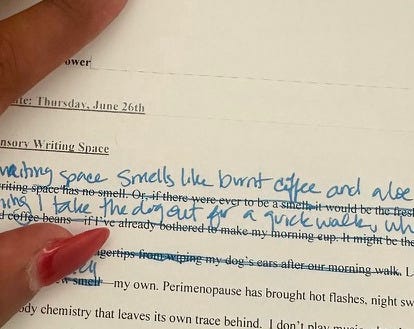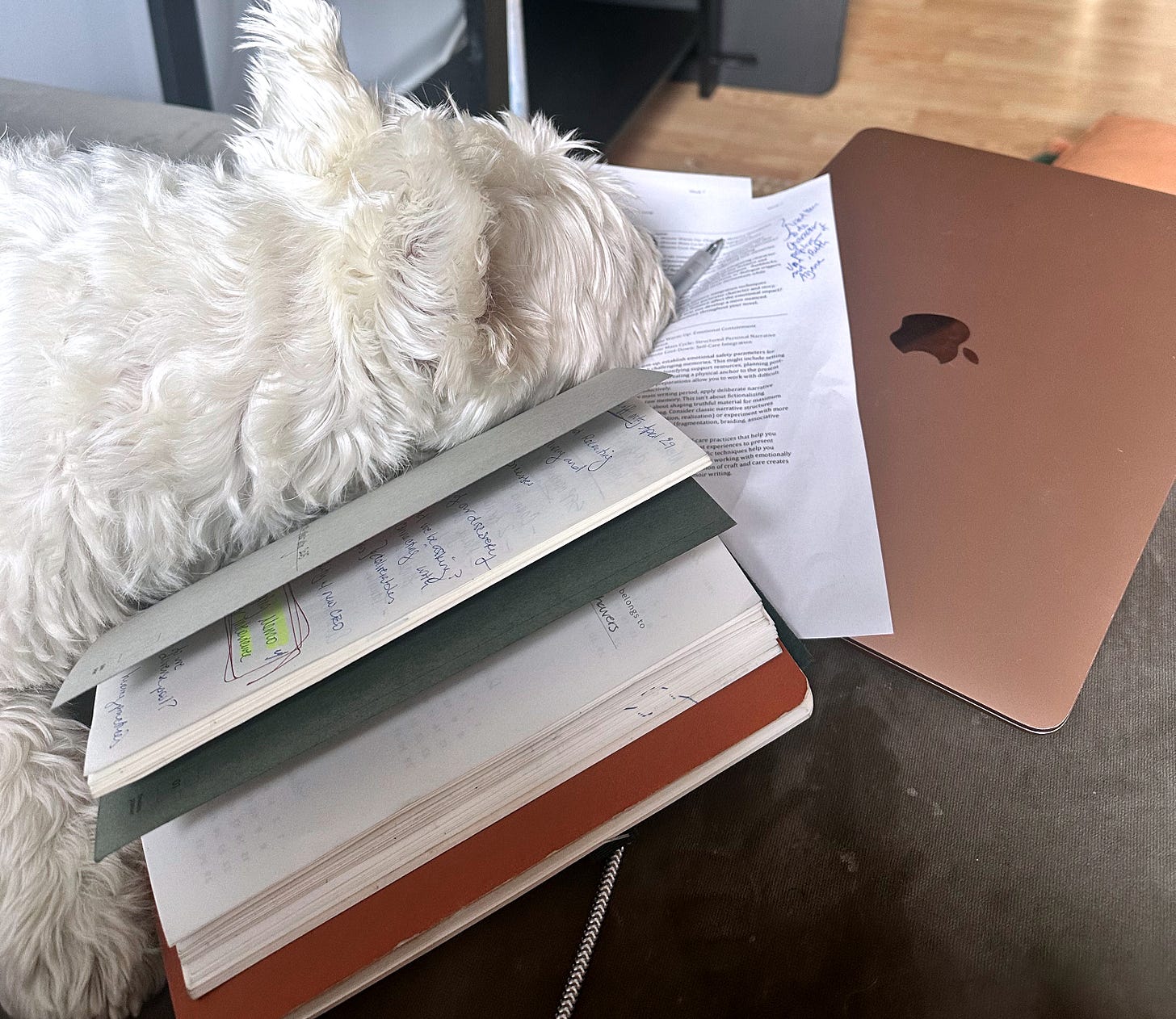A Sensory Writing Space
My writing space smells like burnt coffee and aloe vera. Every morning I take the dog out for a quick walk. When we return I give him his supplements (skin, joints, mood), brush his teeth, and wipe his ears with aloe-infused wipes. He has terrible allergies. I then make my cup of freshly ground coffee and pour in a little oat milk. Lately, there’s been the faint hint of a new smell—my own. Perimenopause has brought hot flashes, night sweats, and a shifting body chemistry that leaves its own trace behind. I don’t play music when I write. I like the sound of stillness interlaced with the birds chirping outside, the horn of the food truck delivering breakfast to construction workers across the street, my dog sighing after his busy morning of being walked, fed, and paying no bills. These expected sounds ground me. They center me so that the voice I need to write with is the loudest thing I hear.
This is the sensory space where I open my notebook to begin my morning pages. I must always write by hand before typing. On every page I’m creating something alive and permanent by pinning the top corners with my left hand and guiding the pen with my right. Blue ink curls into cursive. The pressure of the pen, the texture of the paper, the way ink pools when I pause—this is my writing. This is my ritual.
It’s the same with reading. I have a Kindle, but it’s for emergencies only. Usually travel -related where I have already packed too many books while knowing I will still make time to stop through Hudson News resulting in around four books I’m stuffing into my carry-on. To read, I need to hold the book, to feel the pulp of the page, to stop my finger mid-line when a sentence knocks the breath out of me. Without touch, I do not absorb. I cannot perceive it in full.
The Challenge of the Muck
It’s the muck. It’s the staying in the muck. This is what I said to myself after a recent conversation with a writer friend.
We were talking about how I rush through things—writing, decisions, endings. I started to consider how I don’t stay anywhere. Not in jobs. Not in relationships. Not in discomfort. The moment I perceive a threat—real or imagined—I bolt. It’s not that I’m unreliable or unstable, either. But if I am always looking for threat then I will surely find it in order to justify an exit I was already expecting to make.
What is this muck? It’s the middle. It’s the part I never want to stay in.
Writing is no different. I’ll write something true, something sharp, something raw. I’ll get it down on the page. And then I’ll abandon it. I won’t return. I won’t process. I won’t revise. Years ago, in a graduate writing seminar, a peer reader described my writing as if “….you’ve dropped this huge bomb and then you watch as we all try to pick up the pieces blown apart.” I think about this often because it is still so applicable. There is a destructive nature to revision and there’s a destructive nature to me and how I relate to the world. It makes for a messy life.
Revision is both destructive and creative and it is that choice which sends me running. There’s a memory, one that haunts and hurts. I write it down. I write it down to get it further away from me. I write it down so I can hold it in my hands at my mercy. I have described the moment and that should be enough. But to stay with it, to stay with the writing in order to reconsider what I have determined to let go…that is a scary tricky thing. How long before the words see me, too? How long before they grow too big and thorny for my hands to contain them? I can’t stay here.
Revision means returning to the mess. It means touching the wounds again. And that, I think, is the part I’ve learned to avoid—not because I don’t care, but because I’m scared. Scared the cleanup will be worse than the blast. That the second encounter might be what kills me.
So I bomb through everything. I blow it up. And then I flee the rubble.
Why does revision feel like destruction? Why do I resist editing? Because change threatens the integrity of the arrival. I’m afraid revision will become erasure – that if I touch it again it disappears.
My inner critic tells me that going back—to edit, to reflect—is indulgent. That it will make things worse. That I’ll suffocate in the very words I laid down in hope.
So I never stay. I never revise. And when I don’t revise, I don’t risk being seen. I wreak havoc on the page and get offended when someone (even you, dear reader) says, who left this mess?
The answer is a simple one. I must acknowledge the urge to flee. I must recognize the moment I want to shut the notebook, leave the job, end the relationship—and instead, I must stay.
Just a little longer.
To revise means to believe there’s something worth returning to. I have to make a home for it. That is the real work.
Have you had such moments or experiences? Ones that you keep circling instead of staying within? What makes you leave? What makes you stay?






